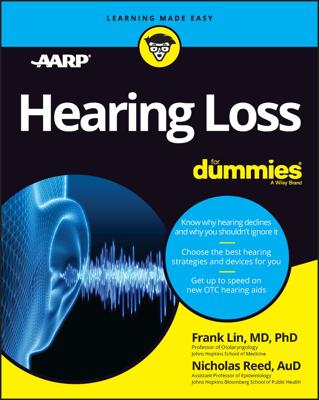Improve your hearing, enhance your life
With new advice on just-released over-the-counter hearing aids
Hearing loss can be frustrating, but in fact it’s common and treatable. Hearing Loss For Dummies, written by top experts in the field in collaboration with AARP, walks you through how to get the help you need to clearly hear the sounds of life—whether you’re at home, at work, or out and about. And hearing health is critical: Hearing loss can increase your risk of falls and injuries, isolation and depression, and even cognitive decline and dementia.
Authors Frank Lin and Nicholas Reed at the Johns Hopkins School of Medicine lay out the steps to hearing health:
- Understanding how hearing works—and how it changes as we age
- Finding specialists you can trust
- Determining whether you need testing and, if so, where to turn
- Using your Hearing Number™ to monitor how your hearing changes over time
- Learning practical solutions for hearing better at home, at work, on the phone, and in restaurants and theaters
- Choosing the right hearing aid, including just-approved over-the-counter hearing aids, and getting them adjusted to work for you
- Exploring the pros and cons of cochlear implants and other surgical options
- Covering the costs of hearing health care
If you’re concerned about your own or a friend or relative’s hearing, this is the one book you’ll need. For what can seem like a complicated, stressful and lengthy process, Hearing Loss For Dummies tackles the topic head-on and provides you with expert guidance to put your mind at ease on the path to better hearing.
* ™ Johns Hopkins University
Improve your hearing, enhance your life
With new advice on just-released over-the-counter hearing aids
Hearing loss can be frustrating, but in fact it’s common and treatable. Hearing Loss For Dummies, written by top experts in the field in collaboration with AARP, walks you through how to get the help you need to clearly hear the sounds of life—whether you’re at home, at work, or out and about. And hearing health is critical: Hearing loss can increase your risk of falls and injuries, isolation and depression, and even cognitive decline and dementia.
Authors Frank Lin and Nicholas Reed at the Johns Hopkins School of Medicine lay out the steps to hearing health:
- Understanding how hearing works—and how it changes as we age
- Finding specialists you can trust
- Determining whether you need testing and,
If you’re concerned about your own or a friend or relative’s hearing, this is the one book you’ll need. For what can seem like a complicated, stressful and lengthy process, Hearing Loss For Dummies tackles the topic head-on and provides you with expert guidance to put your mind at ease on the path to better hearing.
* ™ Johns Hopkins University

